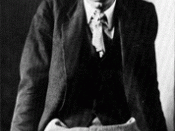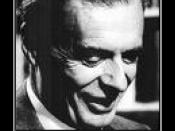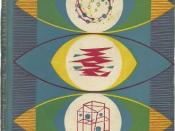What is civility? What is a 'civilised man'? And what, may we ask, is a 'savage'?Civility is nothing more than an unintentional by-product of human sentience. It is a collection of rules and routines, both written and unwritten (differing from one culture to another) which human society adopts in order to establish and maintain a defining identity to which many of the individual members' desire to conform, in aid of establishing and maintaining a sense of belonging within their society. However, the concept of civility becomes a virtually meaningless one if it is not accepted (or understood) and its dictates are not followed. Therefore a 'civilised man' is one that believes in and holds to the dictates of the socially accepted definition of civility. These societal definitions are plentiful and varied, whether it be the etiquette associated with eating (for example, the correct use- or misuse- of cutlery), the action of wearing clothes or the correct form of address for elders.
There is no single step to remove civility or to descend into savagery, for, to remove the beliefs of a person is akin to removing the person's character - an incredibly powerful and complex action.
Those objects or creatures that are considered 'savage' are of an "uncultivated, untamed, wild, uncivilised ⦠fierce, brutal [&] cruel"ù disposition and savage, as a concept, is one of an violent, wild individual. This definition conjures visions of a violent, destructive being bent on dominating or destroying (much like King Kong - pre-Ann Darrow) anything in its path.
However if you consider a 'savage' to be someone who has simply had the veneer of civility removed (with scissors, perhaps?) then the situation is quite different. If a savage, the supposed antithesis to civility, is a person who follows only the basic human instincts, to eat, to sleep and to procreate then what be the 'civilised man'? An insomniac, anorexic priest?What is there to turn a 'civilised' man 'savage'? Take away his clothing, his cutlery, his house, and what do you have? Not a killing machine. Not a man without rules or beliefs. You have a naked, homeless man with a distinct lack of teaspoons, who still understands and conforms (as far as is possible) to social standards. Take away his food supply and what do you have? A vicious cannibal? No. You have a desperate man, a resourceful man. But not a cannibal! Why is this? It is because he still has, deep in his psyche, the notion of civility - the deeply ingrained belief in the social framework - which no single step can remove.
A 'civilised' person must have a motive to resort to savagery. The motive can be as simple as the need for sustenance beyond the means of civilisation to provide (which will drive an individual to savagery through appellation to one of the three basic governing instincts mentioned above - the instinct to eat, to sustain himself). To fulfil this need, to provide himself with the protein his body requires, he must kill and eat an animal. The primitive man knows not of the supplements that can provide protein in a vegetarian diet. His only option is meat. Even if he were 'civilised', why would he abstain from eating meat? Homo Sapiens evolved to eat meat, otherwise their incisors would be formed differently, and they would be ill-equipped to do so. Humans have been killing and eating animals for centuries. However, in today's society, they are generally bred for eating, as opposed to being hunted down and killed by the bare hands, or rudimentary tools of the unskilled, 'uncivilised' individual. The man stripped of his capacity to obtain food in the modern way must resort to these primitive techniques in order to continue his survival - he must descend into 'savagery' in order to fulfil the basic human instinct. However, this is not fulfilled in a single step - it will take dire circumstances for a 'civilised' individual to resort to such 'savage' ways.
In his book, The Doors of Perceptionò, Aldous Huxley states that "â¦man is a creation of belief and knowledge and, without his beliefs and his knowledge, he is no longer man". He goes on to state that "â¦civilisation revolves around the idea of substance and provision. Without these there is an eventual collapse of both knowledge and belief into chaos and despairâ¦". To whit, when there is depravation, an isolated society will tend to collapse, much akin to the idea of entropy (in fact, Huxley outlines his idea of societal entropy later in his work). The only way to strip an individual of their civility is through great deprivation - always a combination of complex factors, most definitely not a single step.
Coupled with depravation, a second factor that could affect the mildly deprived individual is the adaptation of his mental state through music and religious/quasi-religious ritual. In Lord of the Fliesó by William Golding, boys stranded on a desert island fall into a violent pack mentality, driven by tribal chanting and a depressed, deprived state, eventuating with the boys, in their frenzy, killing a member of the group whilst delusional with a complex mix of ritual (chanting "Kill the pig! Cut his throat! Kill the pig! Bash him in!"ó), fear and hunger.
There is no clear way to define the supposed 'one step' that can drive a human being to savagery. If you were to strip the sentence 'Civilised Man Is Only One Step Removed from a Savage' of its conventions and commonly accepted phrases typical of the English Language (in other words, its hypothetical 'civility') then it literally means that 'civilised man' is a step, perhaps a rung on a ladder, or a step in a staircase which has been physically removed from a 'savage'. This sentence isn't particularly violent, or offensive. It is not a savage sentence, just as the man stripped of the guidelines and etiquettes accepted by society is not a savage. However, if a vestige of meaning is retained - in assuming that by a 'step', it means some kind of interference with the ordinary and habitual working of an individual's life - then it can be understood that 'civilisation' is a single action, a single event, above 'savagery' in the human mental lexicon. This is patently untrue - as outlined previously it requires tremendous and complex pressures to completely rob humanity of its 'civilisation' just as it required many complex and intriguing events to create (as it has been building for millennia).
A final thought - from a contemporary Western viewpoint, many of the population who live and function in our different societies are far removed from the savage, or the 'primitive' or proto-humans that came before us. However, to examine civilisation subjectively, the questions must be asked, have we become progressively more savage, due to our lack of caring for and understanding of nature? As nomadic or semi-nomadic peoples we tended and cared for the land. Whereas, what have we now, as civilised beings? Global warming, salinity problems and a population explosion to rival that of rabbits? The latter probably relating to a dose of leisure-driven overkill on the third basic human instinct. Is it hypocritical to say that we, as a collective whole, have all these problems, but are not 'savages', when we care less for the future generations and more for our buying power?To conclude; "The mountains, the forest, and the sea, render men savage; they develop the fierce, but yet do not destroy the human." -Victor Hugo.
ù Oxford University, The Oxford English Dictionary Second Edition (OED2) Volume XVI, Oxford, Oxford University Press.
ò Huxley, A., & Huxley, A. (1977). The doors of perception ; and, Heaven and hell. St Albans: Triad.
ó Golding, W. (1959). Lord of the flies a novel. New York, Berkley Pub.
Victor Hugo, notable French Romantic poet, playwright, novelist, essayist, visual artist, statesman, human rights campaigner.





